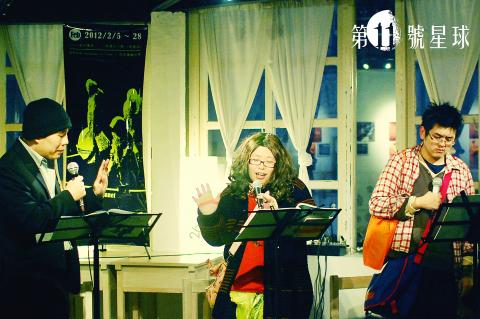While Tibetan culture is celebrated across the capital, the plight of people living on the streets is being put under the spotlight by Homeless in Taipei (流浪讀劇計畫), an ongoing project initiated by the Wanhua Theater (萬華劇團).
Homeless in Taipei began with two men and one woman from the theater group spending several nights sleeping on the streets earlier this month. They were not allowed to take any money with them, but were free to use other resources to find food and a place to get some shut-eye. Another team of three will undertake the same mission on Feb. 24.
“We want to gain a better understanding of what it’s like to be homeless,” the troupe’s artistic director Chung Te-fan (鍾得凡) told the Taipei Times.

Photo Courtesy of Wanhua Theater
The idea of living a homeless life came from The Eleventh Planet, a play by noted Slovene writer, poet and playwright Evald Flisar. It tells a story of three vagrants, Peter, Paul and Magdalene, who cannot resist the temptations of the world of the “bonkers” (hard-working citizens) they claim to despise. The three believe they have been chosen to go to the solar system’s 11th planet where they will find a utopian living environment.
The Eleventh Planet’s script was translated to Chinese by Ting Fan (丁凡), a member of Wanhua Theater, and recently went on sale in Taiwan.
To Chung, Flisar uses the play’s characters as metaphors to describe the nature of existence in a capitalist society. In order to draw attention to the beautifully written script, the troupe has organized 11 play-reading sessions by actors and nonprofessionals who will join the troupe’s members living on the streets.
The play-reading sessions will be held in different locations across the capital, mostly in old parts of town, including Wanhua (萬華) and Datong (大同) districts.
Though he spent a few days living on the streets earlier this month, Chung says he had not really “put himself out there.” Because the weather was cold and the participants didn’t have enough clothes to wear and food to eat, they spent most of the time cuddling each other to keep warm.

Dissident artist Ai Weiwei’s (艾未未) famous return to the People’s Republic of China (PRC) has been overshadowed by the astonishing news of the latest arrests of senior military figures for “corruption,” but it is an interesting piece of news in its own right, though more for what Ai does not understand than for what he does. Ai simply lacks the reflective understanding that the loneliness and isolation he imagines are “European” are simply the joys of life as an expat. That goes both ways: “I love Taiwan!” say many still wet-behind-the-ears expats here, not realizing what they love is being an

Every now and then, even hardcore hikers like to sleep in, leave the heavy gear at home and just enjoy a relaxed half-day stroll in the mountains: no cold, no steep uphills, no pressure to walk a certain distance in a day. In the winter, the mild climate and lower elevations of the forests in Taiwan’s far south offer a number of easy escapes like this. A prime example is the river above Mudan Reservoir (牡丹水庫): with shallow water, gentle current, abundant wildlife and a complete lack of tourists, this walk is accessible to nearly everyone but still feels quite remote.

It’s a bold filmmaking choice to have a countdown clock on the screen for most of your movie. In the best-case scenario for a movie like Mercy, in which a Los Angeles detective has to prove his innocence to an artificial intelligence judge within said time limit, it heightens the tension. Who hasn’t gotten sweaty palms in, say, a Mission: Impossible movie when the bomb is ticking down and Tom Cruise still hasn’t cleared the building? Why not just extend it for the duration? Perhaps in a better movie it might have worked. Sadly in Mercy, it’s an ever-present reminder of just

Google unveiled an artificial intelligence tool Wednesday that its scientists said would help unravel the mysteries of the human genome — and could one day lead to new treatments for diseases. The deep learning model AlphaGenome was hailed by outside researchers as a “breakthrough” that would let scientists study and even simulate the roots of difficult-to-treat genetic diseases. While the first complete map of the human genome in 2003 “gave us the book of life, reading it remained a challenge,” Pushmeet Kohli, vice president of research at Google DeepMind, told journalists. “We have the text,” he said, which is a sequence of